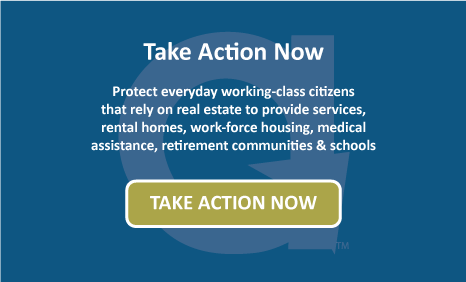BLOG
Stop the Rhetoric - Understanding the Social Impact of 1031 Exchanges on America

When President Biden released his American Family Plan last week, under which Internal Revenue Code (IRC). The comprehensive set of tax laws created by the Internal Revenue Service (IRS). This code was enacted as Title 26 of the United States Code by Congress, and is sometimes also referred to as the Internal Revenue Title. The code is organized according to topic, and covers all relevant rules pertaining to income, gift, estate, sales, payroll and excise taxes. Internal Revenue Code Section 1031 like-kind exchanges would be severely limited, the true negative impact this would have on America began to sink in. Not the impact to the corporations or the high-net worth individuals that so routinely and inappropriately are pegged as the sole beneficiaries of Section 1031, but to the American public – everyday working-class citizens who rely on real estate to provide services, rental homes, work-force housing, medical assistance, retirement communities, and schools, just to name a few. Should 1031 exchanges be impacted, many Americans will experience either lack of services or dramatic increases in costs to receive similar benefits.
Because owners and investors of real estate have been leveraging Section 1031 for over 100 years, America’s economy and people reap the benefits of this time proven tax strategy. When certain sectors of U.S. real estate are not providing their most useful and economic utilization to owners, neighborhoods, and cities, that real estate should be repurposed. By providing a deferral of the gain –not an avoidance –through a 1031 exchange, the owner of the property is able to reinvest the proceeds back into the U.S. economy and place them into a more productive property benefiting the investor, the recipients who utilize the property, and the communities where these properties are located.
Today, 1031 exchange real estate investors are choosing more and more to invest in social impact projects benefiting neighborhoods, communities, and our country. In recent years, up to 70% of targeted project funding needs were benefited by 1031 exchange proceeds. These included a Special Needs School in Minnesota in 2019, a Goodwill Store in Florida last year, and a Fertility Clinic in Illinois this year. Other examples include numerous Dollar General thrift stores, DaVita Kidney Care centers, CVS Pharmacies, Fresenius Medical Care dialysis centers, and Walmart's. Since these projects are larger investment opportunities overall, aggregating multiple real estate investors’ exchange proceeds is necessary to ensure these impactful projects are completed. For the builders focused on making a social impact, 1031 exchange monies are cheaper, less risky, and faster to deploy than typical funding sources. Absent 1031 exchanges, these projects, if they even get funded, would require a higher cost of after-tax capital, including more debt, causing the increased cost to be pushed to the ultimate residents of the property in the form of higher rents.
Investments into single family rentals (SFRs) are another example of 1031 exchange proceeds supporting social impact. Across the U.S., investors are recognizing the investment opportunities and the importance of securing rental properties to provide housing other than multi-family properties. During the COVID-19 pandemic, and for years to come, families will continue to seek a home as opposed to dense community living. For SFR companies that eventually sell the homes to their renters, using 1031 exchanges keeps their cost of capital low due to the deferral, which allows them to pass that on through lower rents and lower sale prices to the eventual tenant and buyer
So, for skeptics out there, first understand the rules around Internal Revenue Code Section 1031 and stop the rhetoric that ‘only the rich benefit from 1031 exchanges.’ Section 1031 is not simply checking the box, or filing an IRS form, or even hiring enough attorneys to avoid paying gains. No, facilitating a proper 1031 like-kind exchange requires planning, coordination with buyers and sellers, prohibiting both these and access to the funds through agreements with a qualified intermediary. Section 1031 exchanges benefit everyone –as long as everyone follows the rules. And if you really want to understand the impact of 1031 exchanges, look around your neighborhood, your community, and your city. 1031 exchanges help build and service America.


